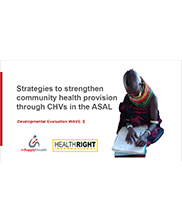The Development Evaluation (DE) approach focuses on gathering and understanding information during the implementation process, and iterating programming approaches in real time.
Wave II of the DE exercise focused on the activities and outcomes of three community health projects in arid and semi-arid lands (ASAL) which serve nomadic, semi-nomadic, and static communities: 1) Supply Chain Alternatives for the Last Mile (SCALE) implemented by inSupply Health which aims to improve supply chains to reach underserved communities in Samburu, Turkana Wajir and Mandera, 2) Afya Timiza Implemented by Amref Health Africa, aims to improve family planning, reproductive, maternal, newborn, child and adolescent health (FP/RMNCAH), nutrition and water, sanitation and hygiene (WASH) services in five sub-counties located in Samburu and Turkana, and 3) Nomadic Health Program (NHP) Implemented by Save the Children, which seeks to increase the use of quality FP services among nomadic and semi-nomadic populations in six sub-counties Wajir and Mandera.
The evaluation focused on three learning questions that explored the barriers to Community Health Volunteer (CHV) motivation, strategies, and processes to implement Community Based Distribution (CBD), and the extent to which COVID-19 has affected program implementation and community health activities.


